Related Research Articles

Politics in Portugal operates as a unitary multi-party semi-presidential representative democratic republic, whereby the Prime Minister of Portugal is the head of government, and the President of Portugal is the non-executive head of state with several significant political powers they exercise often. Executive power is exercised by the Government, whose leader is the prime minister. Legislative power is primarily vested in the Assembly of the Republic, although the government is also able to legislate on certain matters. The Judiciary of Portugal is independent of the executive and the legislature. The President exerts a sort of "moderating power", not easily classified into any of the traditional three branches of government.

The Socialist Party is a social-democratic political party in Portugal. It was founded on 19 April 1973 in the German city of Bad Münstereifel by militants who were at the time with the Portuguese Socialist Action. The PS is a member of the Socialist International, Progressive Alliance and Party of European Socialists, and has nine members in the European Parliament within the Progressive Alliance of Socialists and Democrats group during the 9th European Parliament. It has been the governing party of Portugal since November 2015, subsequently winning the 2019 and 2022 legislative elections.

The CDS – People's Party is a conservative and Christian democratic political party in Portugal. It is characterized as being between the centre-right and right-wing of the political spectrum. In voting ballots, the party's name appears only as the People's Party, with the abbreviation CDS–PP unchanged.

António Luís Santos da Costa is a Portuguese lawyer and politician who has served as the 119th prime minister of Portugal since 26 November 2015, presiding over the XXI (2015–2019), XXII (2019–2022) and XXIII Constitutional Governments. He is demissionary, having resigned on 7 November 2023 following an investigation into a corruption scandal.
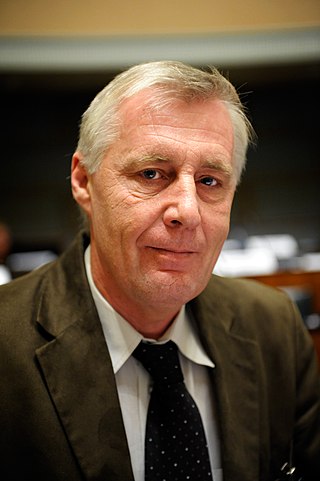
Henrik Dam Kristensen is a Danish politician and a former speaker of the Danish parliament. He has been a member of the Danish parliament for the Social Democrats from 1990 to 2004 and again from 2007, during which he served as Minister for Agriculture and Fisheries (1994–1996), Minister for Food (1996–2000), Minister for Social Affairs (2000–2001), Minister for Transport (2011–2013) and Minister for Employment (2014–2015). He served as President of the Nordic Council in 2011 and 2016.

Luís Manuel Capoulas Santos is a Portuguese politician, who served as Minister of Agriculture, Forests and Rural Development.

Scotland was a constituency of the European Parliament created in 1999. It elected between eight and six MEPs using the D'Hondt method of party-list proportional representation every five years from 1999 until 2020. The constituency was abolished after the United Kingdom left the European Union on 31 January 2020.

East of England was a constituency of the European Parliament that was coterminous with the East of England region. It returned 7 MEPs using the D'Hondt method of party-list proportional representation, until the UK exit from the European Union on 31 January 2020.
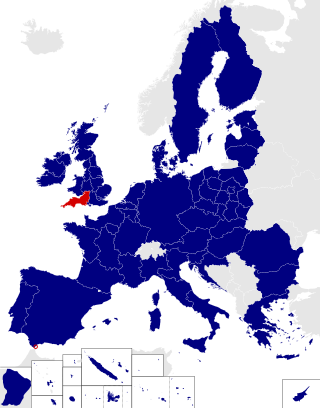
South West was a combined constituency region of the European Parliament, comprising the South West of England and Gibraltar. Seven, later six, Members of the European Parliament using closed party-list proportional representation allocated using the D'Hondt method of distribution were elected. The constituency was abolished when Britain left the European Union on 31 January 2020.
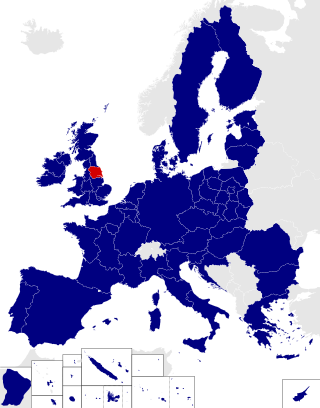
Yorkshire and the Humber was a constituency of the European Parliament. It elected six Members of the European Parliament (MEPs) using the D'Hondt method of party-list proportional representation, until the UK exit from the European Union on 31 January 2020.
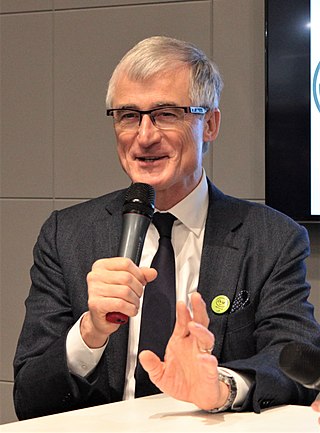
Geert Albert Bourgeois is a Belgian politician of the New Flemish Alliance (N-VA), which he founded in 2001, who is currently serving as a Member of the European Parliament since 2019. He previously served as the Minister-President of Flanders from 2014 to 2019. Prior to this, he was a member of the federal Chamber of Representatives for the People's Union from 1995 to 2001, and then for the N-VA from 2001 to 2004. He has been involved in local and regional politics in Flanders since 1976.

Ewa Bożena Kopacz is a Polish politician who has served as a Vice-President of the European Parliament since 2019. She previously was Marshal of the Sejm from 2011 to 2014, the first woman to hold the office, as well as Prime Minister of Poland from 2014 to 2015. In addition, Kopacz was Minister of Health from 2007 until 2011. Since 2001, she has been a member of Civic Platform, which she chaired from 2014 to 2016. Kopacz succeeded Donald Tusk as prime minister, becoming the second woman to hold the office after Hanna Suchocka (1992–1993). Her term as prime minister ended on 16 November 2015, when she was succeeded by Beata Szydło.

Beata Maria Szydło is a Polish politician who has served as a Member of the European Parliament (MEP) since 2019. A member of Law and Justice (PiS), she previously served as Prime Minister of Poland from 2015 to 2017. Szydło became the third woman to hold the office, after Hanna Suchocka and her immediate predecessor Ewa Kopacz. She currently is a vice-chair of the European Conservatives and Reformists (ECR) group in the European Parliament.

Bernard Trevor Colman was a former UK Independence Party politician. He was a Member of the European Parliament (MEP) for South West England.
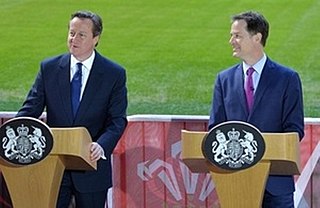
The Cameron–Clegg coalition was formed by David Cameron and Nick Clegg when Cameron was invited by Queen Elizabeth II to form a government, following the resignation of Prime Minister Gordon Brown on 11 May 2010, after the general election on 6 May. It was the UK's first coalition government since the Churchill caretaker ministry in 1945.

João Nuno de Lacerda Teixeira de Melo is a Portuguese lawyer, conservative politician and Member of the European Parliament (MEP) representing the Democratic and Social Centre – People's Party (CDS-PP), of which he is its president.
References
- ↑ Resigned in 2016, replaced by Manuel António dos Santos.
- ↑ Took office in 2016, replacing Elisa Ferreira.
- ↑ Resigned in 2016, replaced by João Pimenta Lopes.
- ↑ Took office in 2016, replacing Inês Zuber.